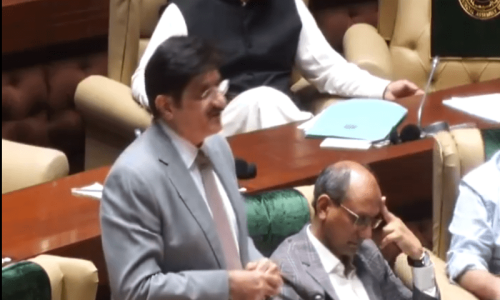KARACHI: Chief Minister Syed Murad Ali Shah and World Health Organisation delegation led by Health Emergencies Programme Executive Director Dr Michael Ryan discussed on Thursday the overall flood situation, urgent needs, and emerging public health threats.
Dr Ryan told the CM that the WHO mission had taken an aerial view of the flooded area and visited high calamity-hit districts in the province to assess the needs on the ground.
The chief minister said that the unprecedented rains inundated 18.8 per cent or 12,541.6 square km of the total populated areas of the province, as a result, 7.2m people were displaced. He added that in 2,782 relief camps set up all over the province, around 400,000 people were accommodated.
The chief minister said that 410 medical camps, including mobile camps, had been established with a workforce of 600 doctors, 1125 paramedics, and 350 volunteers.
Mr Shah said that in September alone, 96,658 cases of diarrhoea among children below five years, had been treated.
Talking about malaria, he said that 20,623 patients were screened on Sept 28, of them 2,942 malaria cases were detected, including 1,960 in Hyderabad division, 1,375 Larkana, 989 Mirpurkhas, 354 Sukkur, 148 Shaheed Benazirabad, 116 Karachi.
He added that 3,869 patients were screened for dengue, of them, 6,603 were detected positive. Health Minister Dr Azra said that 9,172 cases of dengue had been detected in 2022.
The health minister said that 9,829 pregnant women were living in the camps, of them, 9,010 had been given dietary supplements, 7,897 women received Tetanus Toxoids (TT) and Tetanus-Diphtheria (TD), while 3,756 deliveries had been conducted.
The WHO extended full cooperation in establishing coordination and support on the provision of safe drinking water, robust disease surveillance and response system, strengthening health services, provision of medicines and supplies, addressing malnutrition and access to health services
The meeting was told that the WHO had established four emergency operations centres in the province to respond to flood emergencies and to work closely with the health department and district administration.
It was told that WHO was supporting the provincial government in the establishment of 50 Nutrition Stabilisation Centres, strengthening the health system through the provision of essential health services and refurbishment/ renovation of health facilities.
The meeting was further informed that the WHO had handed over 12 boats and 27 vehicles for outreach health services, provision of aqua tablets, and water purification plants in Dadu and Qambar-Shahdadkot.
Delegation visits Sukkur
Dr Ryan and WHO Country Representative Dr Palitha Mahipala visited emergency health facility at Labour Colony in Sukkur on Thursday and assured that WHO would provide additional support to Sindh to help the government’s efforts to provide emergency health services to the stranded population.
He said this while talking to Sukkur Commissioner Ghulam Mustafa Phul at his office.
Dr Ryan, who is on an emergency visit to Pakistan, arrived in the city to witness the flooded areas and ascertain issues in the emergency rehabilitation of the flooded population, and said that the catastrophe was so massive that the international organisation and community had to act fast.
He said the WHO would provide more medicines and health kits for pregnant women to curtail malaria and water-borne diseases.
Briefing the delegation, the commissioner said that overall 2.56 million individuals were directly affected by floods, losing their homes and crops in Sukkur district.
The delegation inaugurated the Sukkur Hub (Emergency Operations Centre), and Dr Mahipala said that hub was being established to support government efforts in the relief and recovery operations in the province, and it would be a centre for all coordinated efforts and would also work as a nerve centre with partner UN agencies and NGOs.
The delegation also visited the Sukkur Labour Colony medical facility for the flood victims.
The meeting was informed that 1.65m people in Sukkur, Khairpur and Ghotki were displaced while 94 health facilities in the area had been damaged.
The meeting was told that 517 camps for Internally Displaced Persons (IDPs) had been established where 289,580 persons were accommodated.
Published in Dawn, September 30th, 2022














































Dear visitor, the comments section is undergoing an overhaul and will return soon.